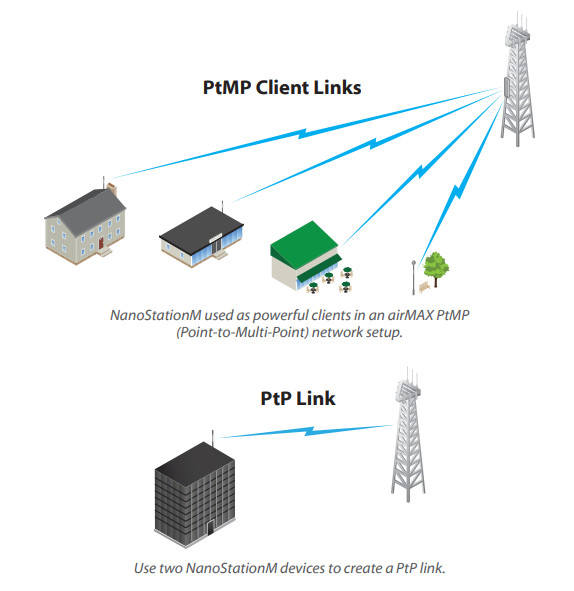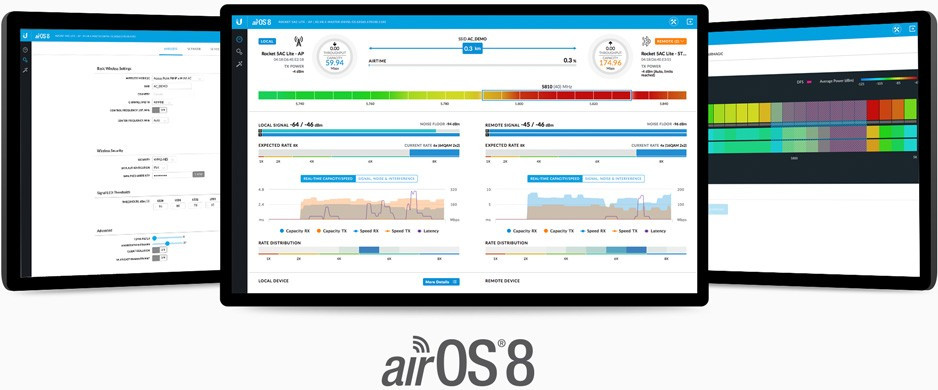Cost-effective airMAX 2.4 GHz CPE model with link rage up to 15 km
The Ubiquiti airMAX NanoStation M2, designated by the model manufacture part number NSM2, stands as a pivotal component within Ubiquiti Networks’ esteemed portfolio of wireless networking devices. Tailored for the innovative airMAX protocol technology, the NanoStation M2 is engineered to deliver unparalleled point-to-point (PtP) and point-to-multipoint (PtMP) network solutions, catering primarily to the 2.4 GHz frequency band. This particular band selection makes the NSM2 versatile for a wide array of applications, from broadband home access to CCTV surveillance link-ups, especially in areas where the 5 GHz spectrum may be congested or unsuitable.
In a PtP setup, the NanoStation M2 is used to create a direct wireless link between two points. This requires two NanoStation M2 units: one configured as a transmitter and the other as a receiver. Each unit can’t function in a PtP configuration by itself; it needs to be paired with another unit. This configuration is often used to connect two separate networks or buildings over a distance where laying physical cables is impractical.For PtMP applications, the NanoStation M2 can serve as either the base station (access point) or as a client (station) that connects to a base station along with other clients. The base station requires client devices to distribute its signal effectively, meaning it doesn’t work "by itself" in the traditional sense but as part of a larger network structure.
Central to the NSM2’s design philosophy is its integrated dual-polarity 11 dBi gain antenna, which significantly enhances its ability to communicate over distances up to 15 kilometers with clear line-of-sight conditions. This is achieved through the combination of advanced antenna technology and Ubiquiti’s proprietary airMAX Time Division Multiple Access (TDMA) protocol. The TDMA protocol revolutionizes the way data is transmitted and received by organizing data into specified time slots that rotate, thereby reducing latency and improving the efficiency and throughput of the network. This methodical organization ensures that each client device receives and transmits data in a highly efficient manner, virtually eliminating collision and signal interference commonly experienced in non-TDMA networks.
The NanoStation M2 encapsulates its technological prowess within a compact, sleek design characterized by an all-weather resistant enclosure. This robust housing ensures that the device remains operational in diverse environmental conditions, from scorching heat to freezing temperatures, thus providing reliable service without the need for additional protective measures. The device’s design also incorporates a versatile mounting kit, allowing for easy installation on a variety of surfaces, which is crucial for optimal positioning and alignment in wireless network setups.
On the connectivity front, the NSM2 is equipped with a secondary Ethernet port, providing flexibility for linking additional devices without necessitating a separate power source. This feature is particularly useful for deploying networked devices in remote locations, as it supports Power over Ethernet (PoE), streamlining the deployment process by allowing both power and data to be transmitted over a single cable.
Programming and network management of the NSM2 are facilitated through Ubiquiti’s airOS interface, a robust software platform that provides intuitive tools for configuring, monitoring, and administering the wireless network. airOS enhances the user experience with features such as device discovery, signal strength visualization, and network analytics, allowing network administrators to fine-tune the performance and reliability of their wireless links.
Application scenarios
The Ubiquiti airMAX NanoStation M2 (NSM2) excels in innovative applications, transcending its traditional uses to empower community connectivity and enhance outdoor events with reliable internet access. Consider the transformative impact of the NSM2 in rural or urban neighborhoods where the digital divide is a pressing issue. By integrating NSM2 units into a mesh network configuration, communities can establish a wireless network that spans entire neighborhoods, providing essential internet access for educational resources, enabling digital communication, and opening up a wealth of online entertainment options. This grassroots deployment of the NSM2 not only democratizes internet access but also fosters a sense of community through shared connectivity, helping to bridge the gap in areas where conventional broadband infrastructure may be absent or cost-prohibitive.
Moreover, the NSM2 shines in the context of outdoor events, from cultural festivals to local sports competitions, where the demand for seamless internet connectivity is high. By deploying NSM2 devices strategically across event venues, organizers can ensure that attendees stay connected, sharing their moments on social media in real-time, while vendors benefit from reliable networks for digital transactions. This enhances the overall event experience, providing a lifeline for logistics and coordination efforts that are crucial for the smooth operation of any large-scale gathering. The rugged design and easy deployment of the NSM2 make it perfectly suited for temporary setups, illustrating its versatility and effectiveness in meeting the specific connectivity needs of diverse scenarios, from community networking to event management.
Compare with similar products
| | | | |
|---|
| Wireless Standard | |
| |
| 802.11b/g/n
| 802.11a/n
| 802.11ac
|
| 2.4GHz Radio Rate | |
| |
| 150 Mbps
|
|
|
| 5GHz Radio Rate | |
| |
| 150 Mbps
| 450 Mbps
|
| Wireless Antenna Frequency Range & Gain | |
| |
| 2.412 - 2.462 (GHz) 11 (dBi)
| 5.170 - 5.875 (GHz) 16 (dBi)
| 5.150 - 5.875 (GHz) 16 (dBi)
|
| Antenna beamwidth | |
| |
| 55 °
| 43 °
| 45 °
|
| Ethernet Ports | |
| |
| 2 x 100 Mbps
| 2 x 100 Mbps
| 2 x 1 Gbps
|
| Chipset | |
| |
| Atheros MIPS 24Kc, 400 MHz
| Atheros MIPS 74Kc, 560 MHz
| Atheros MIPS 74Kc, 560 MHz
|
| RAM | |
| |
| 32 MB
| 64 MB
| 64 MB
|
| Storage Memory | |
| |
| 8 MB
| 8 MB
|
|
| Operating Temperature | |
| |
| -30 °C to 75 °C
| -30 °C to 75 °C
| -40 °C to 70 °C
|
| Max Power Consumption | |
| |
| 8 W
| 8 W
| 9 W
|
| Weight | |
| |
| 0.40 kg
| 0.50 kg
| 0.233 kg
|
| | | | |
|---|
| Wireless Standard | 802.11b/g/n
| 802.11a/n
| 802.11ac
|
| 2.4GHz Radio Rate | 150 Mbps
|
|
|
| 5GHz Radio Rate |
| 150 Mbps
| 450 Mbps
|
| Wireless Antenna Frequency Range & Gain | 2.412 - 2.462 (GHz) 11 (dBi)
| 5.170 - 5.875 (GHz) 16 (dBi)
| 5.150 - 5.875 (GHz) 16 (dBi)
|
| Antenna beamwidth | 55 °
| 43 °
| 45 °
|
| Ethernet Ports | 2 x 100 Mbps
| 2 x 100 Mbps
| 2 x 1 Gbps
|
| Chipset | Atheros MIPS 24Kc, 400 MHz
| Atheros MIPS 74Kc, 560 MHz
| Atheros MIPS 74Kc, 560 MHz
|
| RAM | 32 MB
| 64 MB
| 64 MB
|
| Storage Memory | 8 MB
| 8 MB
|
|
| Operating Temperature | -30 °C to 75 °C
| -30 °C to 75 °C
| -40 °C to 70 °C
|
| Max Power Consumption | 8 W
| 8 W
| 9 W
|
| Weight | 0.40 kg
| 0.50 kg
| 0.233 kg
|
Technical Specs / Datasheet



Reviews and ratings
Product rating